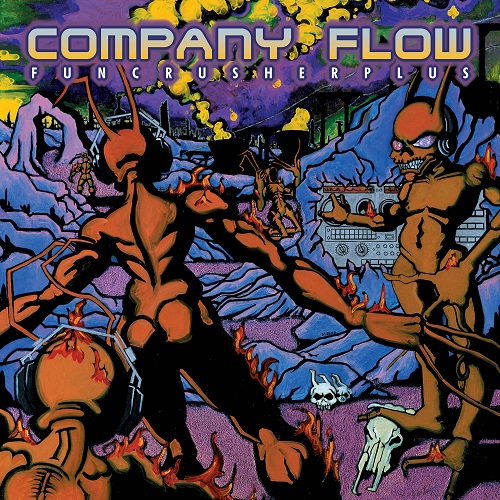By 1997, just when some feared that hip-hop was getting corrupted by success, "independent" and "alternative" had become buzz words. And no other claimed them louder than Company Flow. A product of New-York's underground, these self-produced and self-promoted rappers created their own label, Official Recordings, and they targeted the music industry as the enemy. And their slogan, a very definitive "independent as fuck", was everything but ambiguous.

Founded by 1993, Company Flow had become the heralds of the nascent underground hip-hop movement in 1996, when they released the abrasive Funcrusher, an EP Bigg Jus, El-P and Mr. Len would enrich and improve one year and a few singles later, with the help of Rawkus Records. Per its title, Funcrusher Plus stripped out hip-hop. There wasn't any fun, funkyness or prettiness left to it. Only a handful of vindictive hymns were more or less catchy, like "Silence", or the sitar-infused "The Fire in Which you Burn", a collaborative track with the Juggaknots.
Everywhere else, Funcrusher Plus was hardcore hip-hop at its very rawest. The rhythm was slow, the samples were unsettling, and experimentalism was there, like with the ethereal and hallucinated "Bad Touch Example", "8 Steps to Perfection" and "Krazy Kings". They excelled even more with their revisited version of "Population Control", a slow and apocalyptic track strengthened by a bizarre water sample, or the atmospheric "Info Kill". Funcrusher Plus also looked like an humourless version of Dr. Octagon science-fiction rap, with the weird divagations of "Help Wanted", or Mr. Len's scratches on "Lencorcism" and "Funcrush Scratch".
Despite the soberness, though, Company Flow knew how to drop bombs. The super-minimalistic, "Collude/Intrude" and "Last Good Sleep" were good examples, with their huge pulse, and their complex raps. And though its formula was sometimes overly austere, like with "Blind", the trio had enough strength to sublimate arid tracks like "Legends", "89.9 Detrimental" and "Vital Nerve". The record was excessively rude, hostile and heavy, and though, it would create a new form of hip-hop. It would become the template for a new generation of rappers, and countless underground scenes, obsessed with integrity and uncompromising creativity.
